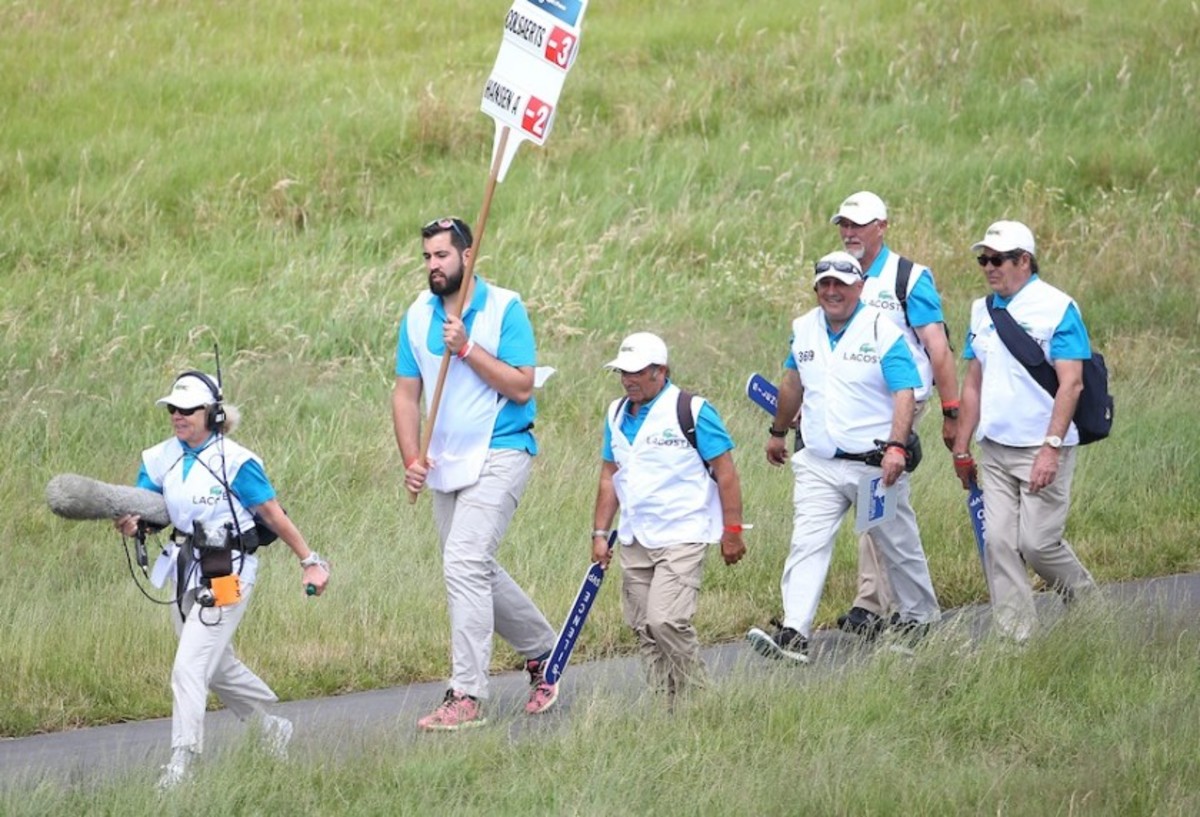Why PGA Tour volunteers have the best jobs in golf

With or without spectators, a PGA Tour event cannot function at an optimal level without the hundreds of volunteers who donate their time and energy to the cause. The list of responsibilities covered by these folks ranges far beyond what most of us could fathom. From picking up players at the local airport to sorting the various brands of balls on the practice range, from marshaling the 15th tee to distributing passes at a will-call window, every duty plays a role in stabilizing a tournament’s infrastructure.

Given the oddities and unprecedented provisions that characterize these uncertain times, it’s worth wondering whether the volunteer factor will be compromised by coronavirus. A large percentage of the workforce at every Tour stop consists of people 50 or older, many of whom are well into their retirement years.
We’re talking about 2,000 men and women at a Players Championship, all of whom pay in the neighborhood of $120 for a few articles of tournament-issued attire and a weekly badge. To those lucky enough to receive an on-course assignment, that $120 buys an oversized portion of tour-pro attitude and perhaps a side dish of drunks who do little more than laugh at any attempt to defend the game’s laws of etiquette.
Quiet, please. “It gives you more of a vested interest in it,” longtime Players volunteer Jim Cotton says of the fee. “You’re entitled to go see some golf and have fun, and my personal perspective is, it’s more like family with all the friendships you make. I don’t think you can ask for a better deal.”
Of the several volunteers I interviewed, none had a negative word to say about reaching into their own pocket to be part of a golf tournament at which the winner receives well in excess of $1 million. There is an obvious measure of pride involved among those who leap at the chance to assist such ample civic gatherings, but they’re not actually volunteers, per se. They are large groups of unpaid help dispersed to perform thankless tasks, and now, they will perform those tasks under the threat of a fatal illness.
Wouldn’t it be prudent to waive the fee for the time being? Especially for guys such as Cotton, who has been working the Players for 23 years, or Jim Kavanagh, who has done 70 or 80 events around the country since hanging up his necktie in 2010. One act of generosity deserves another, although it’s crucial to note that a lot of volunteer-related revenue goes into a tournament’s overall charity donation.
The PGA Tour itself does not require events to charge the volunteers for their services. It falls under local jurisdiction; an overall labor contingent of 1,200 easily could add another $100,000 to the charity kitty. Seeing how a company such as Verizon Wireless keeps giving me 15 gigabytes of free data because the world is currently a mess, would it be too much to ask that volunteers make a contribution on an optional basis, the amount to be determined solely by the conscientious soul writing the check?
Nobody lies awake at night thinking about this stuff, much less worrying about it. You probably could charge Cotton $500 and he’d still show up and do whatever would be asked. Cotton, 52, of St. Augustine, Fla., has been a committee chair at the Players for 17 of those 23 years. Admissions, facilities patrol, patriots outpost (a 21st-century euphemism for military appreciation), offsite shuttles…. He works at Annika Sorenstam’s junior tournament in Orlando and at the Junior Players, an AJGA deal at which 72 of the best under-16s on earth compete at TPC Sawgrass over Labor Day weekend.
The man just loves the game, thank goodness, and there are many more from where he came. As pro golf tiptoes into the gambling/gaming frontier, the role of volunteers in the scoring and ShotLink divisions will become exponentially more vital. For all the money wagered on whether Josh Teater hits the seventh green with a 6-iron on a business-as-usual Thursday afternoon, somebody has to be out there on the seventh hole to supply that data.
Is Teater 189 yards from the flagstick or 198? What’s the wind doing? Did he make a really stupid bogey at the sixth? Did his caddie step off the yardage accurately? Shouldn’t he try to muscle a 7-iron instead? All of these auxiliary variables, each almost completely insignificant to the welfare of the planet several months earlier, suddenly will become essential components to the equation.
I don’t know about you, but I wouldn’t want that kind of pressure, nor do I want to imagine the ruckus that might ensue if the volunteer on that seventh hole made a mistake and cost some knucklehead 20 bucks.
“How will the Tour find people who are truly qualified to fill those jobs?” an insightful observer recently wondered. “The accurate gathering of ShotLink data will become extremely critical. When you factor in the enormous amount of money the Tour will be making as a gaming system becomes reality, should it appropriate funds to tournaments so those qualified people might be compensated?”
Uh, I wouldn’t bet on it.
Kavanagh, 70, also of St. Augustine, already has canceled three trips to serve as a volunteer in 2020. “After a while, the majority of our traveling was to LPGA tournaments,” he says of event-hopping with his wife, Ginny. “The players were just so much nicer. The PGA Tour guys can be so standoffish, actually rude. The LPGA is much different, and most tournaments are very good with the volunteers. It gives us the chance to do something we enjoy. Sure, it costs us some money, but we see different parts of the country and run into some old friends year after year.”
In sickness and in health, it’s worth remembering that the best jobs in life are the ones from which we don’t make a dime.
Sign up to receive the Morning Read newsletter, along with Where To Golf Next and The Equipment Insider.
